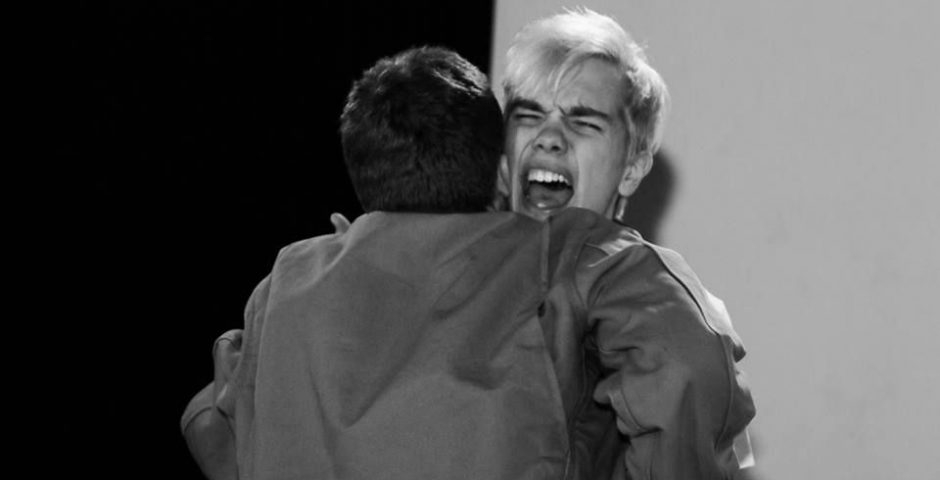
REVIEW: Pomona
A darkly visceral, comedic drama that blurs the line between reality and fiction
From the outset, Pomona is bewildering. Figures shrouded in plastic sit on glowing cubes, each also puzzling over a Rubik’s cube. Electronic music pulses, and a single light bulb swells into burning light, then fades to blackness. This scene extends while the audience enters – we have no choice but to cross the stage itself to get to our seats, and stepping on the floor, black tiles with white lines forming a grid across its surface, is unsettling. Everything is angular, geometrical, and disorienting, and while the story centres around the semi-mythical Pomona, a crumbling concrete island in the middle of Manchester, directionlessness pervades.
Initially, the play feels disjointed, with new characters and contextless action emerging in each scene. Moreover, well-timed bursts of electronic music further dislocate each piece of the episodic narrative. Between scenes, the glowing cubes are used in an impressive variety of ways, but never become overbearing. Nonetheless, each scene is gripping, evocative, and wonderfully brutal; despite each character’s temporal dislocation, the cast’s exceptionally skilful acting makes every scene completely absorbing.

Photo credit: Alex Power
The play’s narrative is such that every visceral, horrifying scene is experienced twice: once as it appears anachronically, and again as it is anchored in the chronology, framed by cause and effect. This is interspersed with confidently-delivered (often absurd) comic moments, which harness the play’s bleakness to great effect. For example, one of the characters reveals his desire to ‘cover the whole city in my jizz […] but yeah, not in a sex way. It wouldn’t be sexy.’
The music and sound effects were generally well chosen, and contributed to the atmosphere well. The use of music did detract slightly from the end of one particularly poignant scene where Ollie’s sister (Rachel Kitts) talked to Fay (Sasha Bobak) about her hatred of her clients, in which silence would have juxtaposed with her anger to greater dramatic effect. However, silence was used effectively elsewhere, and the music largely complemented, rather than hindered, the drama.
Great emotional depth was brought to each role. Keaton (Grace England) was chillingly robotic in some scenes and endearingly enthralled in others, transitioning seamlessly from one to the other with total composure. The extremes of her character highlighted the role escapism played in the show, and the way in which characters seek solace in fantasy worlds and games. Zeppo’s (Benedict Clarke) opening monologue was delivered with verve and dynamism, contrasting interestingly with the same actor’s role as an omniscient seagull towards the end of the play. Gale (Dolores Carbonari) was impressively domineering in her scene with Moe (Harry Redding) and Charlie (Comrie Saville-Ferguson), but also convincingly meek when appearing alongside Keaton. Moe showed that he was the ‘serious one’ in some scenes, but also displayed great tenderness in his touching scene with Fay.

Photo credit: Alex Power
The wide-eyed, deer-in-the-headlights roles of Ollie and her twin were very convincingly delivered, but seemed to lack the same nuance of character that made the other roles so impressive; this may have been a limit of the play itself, rather than the acting. By contrast, the character of Fay had such a well-developed storyline, and seamless character development acted so naturally, that it stood out a little from the acting of the other performers – for better or for worse.
Inter-character relationships were developed equally well. Moe and Charlie’s scenes were extremely impressive in their manipulation of pace and dynamics, the audience made to rise and fall with their every outburst and its dissolution. While a sense of standoffishness benefitted Fay and Ollie’s sister’s first scene (in which they were strangers to one another), a later tender scene between these two still indicated distance, and this precluded showing a development in their relationship. Signalling a closer relationship may have fitted better with the overall arc that Fay’s character took as the play progressed.

Photo credit: Alex Power
At the end of the play, the intensity of the choreography, the acting, and the volume increased to fever pitch, and suddenly dropped off for the final interaction between two characters who, though they had never met, were diametrically opposed: Keaton and Ollie. The final line (‘it sure is quiet here’) teetered on the edge of cliche but the quality of Ollie’s delivery saved it from being so, and instead ensured that the play finished on a tender note.
Throughout the play, a bleak warning was issued, repeated by different characters: ‘don’t get involved.’
We would advise otherwise.
4.5 stars
Pomona is on at the Corpus Playroom until Saturday 17th February. Tickets are £5-7 Thurs, £6-10 Fri/Sat









































